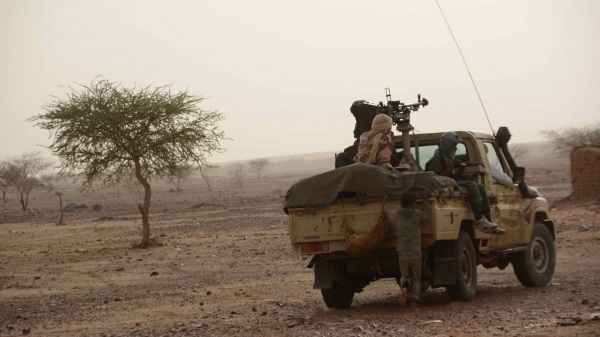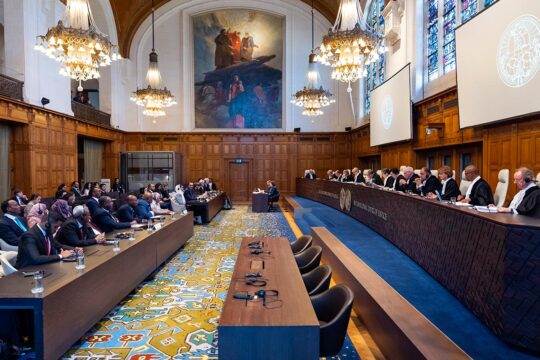Victims are at the heart of Mali’s transitional justice process, aimed at shedding light on grave human rights abuses committed since independence in 1963, especially during numerous rebellions in the North. In this interview with JusticeInfo.Net, the head of Malian human rights group AMDH, Moctar Mariko, stresses the need to guarantee protection for victims and grant them reparations.
JusticeInfo: What do you think of the work that has been started by the Truth, Justice and Reconciliation Commission (CVJR)?
Moctar Mariko: AMDH has had several meetings with the head of the Commission, Ousmane Oumarou Sidibé. We are on the same page as this flagship transitional justice mechanism, which is to work on grave violations of human rights in Mali from 1963 to 2013. I should say that in the beginning we had some concerns about its work. But there has been a rapprochement between AMDH, the International Federation for Human Rights (FIDH) and the Commission, and we have had many working sessions together on collaboration, documentation and how the investigations will be carried out. We are collaborating closely and we will remain vigilant as we monitor how the process develops.
JusticeInfo: What were your initial concerns?
MM: We say there should not be any suspected perpetrators in this Commission because it would be difficult, if not impossible for the victims to come and testify, to describe the atrocities they have suffered. The Commission must be extremely careful in the investigations it carries out. Victims must be reassured, protected and encouraged.
The Commission President’s words are reassuring, but victims come to AMDH to express concerns, saying they have heard that such and such a person is among the Commission members and that this person or persons condoned or participated in crimes. We have drawn this to the attention of the Commission President and stressed that if there are perpetrators on the Commission, the victims will never testify and reconciliation will be difficult.
JusticeInfo: What do you mean by “suspected perpetrators in the Commission”?
MM: I mean representatives, accomplices or people close to armed groups who might be members of the Commission. It is the victims who often complain about this…
Justiceinfo: What will be the contribution of AMDH to the reconciliation process in Mali?
MM: At AMDH, we stress the need for integrity of the process, so it can serve those for whom it is intended. We also point out that victims may not recognize perpetrators, whereas they generally know the groups that were operating in their area at the time crimes were committed. That is why AMDH has put documentation together to help the process of identifying victims and perpetrators or their groups on the ground. We have documented cases of human rights abuses by armed groups on all sides.
We encourage and facilitate access to justice for the victims and consultation with them on reparations. For example, naming a Bamako street after a victim or group of victims can help people to get rid of their resentment. Or a woman who has been raped may want to leave her home region and with help from the State go to live elsewhere. We believe the fight against impunity must include first and foremost victims’ access to justice. They must be allowed to testify before a judge against the suspected perpetrator.
In addition, all victims must be allowed to take legal action if they wish. With regard to this, we must watch out for the influence of traditional and religious leaders who may try to stop people seeking justice. These people are very influential in our society and may dissuade the victims by preaching a kind of fatalism, which does not help reconciliation.
JusticeInfo: Do you think the Truth, Justice and Reconciliation Commission will be independent?
MM: Its President is competent, he is a professor of law, but he is also a civil servant. The other Commissioners are fighters from armed groups or people who are at least very close to these groups. Their work will be very difficult because the civil servant must obey his superiors and the fighters and Malian military men have been implicated in these violations of human rights. But they are men and women who can, if they wish, do their work independently in spite of these constraints.
JusticeInfo: How do you assess the progress of current cases relating to the recent events?
MM: With regard to judicial procedures on human rights abuses linked to Mali’s political and security crisis in 2012 and 2013, we (I mean human rights groups) are fighting for them to be completed.
Amongst cases in the South, there is the one concerning the so-called Diago mass grave, near Kati, on the outskirts of Bamako, where the bodies of 21 “Red Berets” (presidential guard of Amadou Toumani Touré, who was ousted in a March 2012 coup) were found. The investigating judge has closed investigations and referred the case to the prosecuting arm of the Bamako Appeals Court, which issued an order on December 22, 2015 and referred General Amadou Haya Sanogo along with all the other suspects or suspected accomplices of these murders for trial. It remains for a date to be set.
Then the case of Colonel Youssouf Traoré, whose body was found in a well in Kati, is still under investigation by the office of Judge Yaya Karembé, in the Commune III district of Bamako. The investigation still needs to be completed and findings sent to the Criminal Court.
JusticeInfo: What about cases relating to crimes in the North?
MM: These cases are not really progressing because of people being freed for political reasons. As you may know, because of the Ouagadougou accord and its inclusion in trust-building measures many people suspected of grave human rights violations in the North have been freed. We denounced this at the time, saying it was political interference in justice and that it undermined the independence of judges. So these cases are making only minimal progress. On the other hand, there are two other cases still pending before the Commune III tribunal, relating to sexual violence against 80 women. These cases are moving forward, and the judge has heard a lot of the victims.
The other case concerns crimes in Timbuktu, with 33 victims. The case was progressing well, but the judges who were on it have recently been transferred elsewhere. Either they have left Bamako altogether or have been called to other functions. So that has put the brake on it, because the new judges arriving to take over are either not diligent enough or will need to start proceedings again from scratch.






